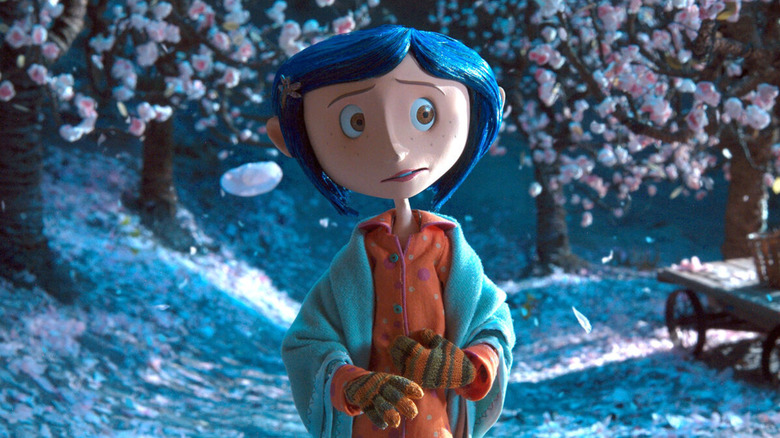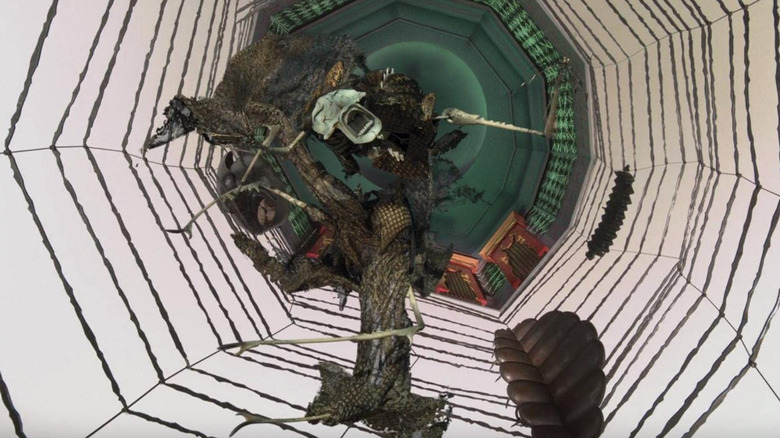The Daily Stream: Coraline Proves Animation Is The Best Way To Adapt Neil Gaiman
(Welcome to The Daily Stream, an ongoing series in which the /Film team shares what they've been watching, why it's worth checking out, and where you can stream it.)
The Movie: "Coraline"
Where You Can Stream It: Tubi
The Pitch: With the first season of "The Sandman" now available to watch, it is fair to say that it is a pretty good adaptation of Neil Gaiman's comic epic. However, some of the stories that felt enchanting on the page don't exactly translate well on the screen, due to how otherworldly and intense Gaiman's work can be. That being said, there is one adaptation of Gaiman's work that has stood the test of time as both a solid representation of its source material and just a great movie in general. Henry Selick and Laika's 2009 film "Coraline" adapts author's 2002 novella to the big screen using stop-motion animation, bringing Gaiman's work to life in ways that simply can't be replicated in live action.
The film follows Coraline Jones (Dakota Fanning) as she moves into an old bed and breakfast with her mother Mel (Teri Hatching) and father Charlie (John Hodgeman). She struggles to feel comfortable in her new home, even after meeting a friendly black cat and the grandson of her parents' landlord, Wybie (Robert Bailey Jr.). When Coraline discovers a portal to a parallel universe where her life was slightly better, she feels compelled to embrace this Other World and leave her reality behind.
Unfortunately, things aren't always better in the Other World, as warned by its version of the wandering black cat (Keith David). After a series of strange occurrences and her Other Mother's insistence on sewing Coraline's eyes shut, the young girl realizes that embracing the Other World means certain death, and she must find a way to close the portal for good.
Why it's essential viewing
The worlds of "Coraline," both regular and Other, are distinctly moody in their own ways. Dark colors and twisty architecture make the setting of the film instantly memorable, yet identifiable as something directed by Selick and adapted from Gaiman. These sets, totaling 150 and located in an Oregon warehouse, were brimming with detail thanks to them being house-made miniatures. Through the stop-motion animation process, these sets and the model characters that resided in them achieved an uncanny balance between real and surreal, something that works perfectly within the framework of the story.
This balance is present throughout many of Gaiman's literary works, especially "Coraline," as it is written in a way that resembles more a recollection of a bad dream rather than a tightly-written story — after all, the Other World is much like a dream itself, with its depiction of a reality that seems normal enough, but has its obviously off-putting changes. Pulling off this surreal and dreamy quality is difficult to do in live action, but with animation, the sky is the limit. Perhaps no better example of this is the climactic battle between Coraline and the Beldam. The effortless morphing of the entity is something that just couldn't have looked nearly as flawless as it does in stop-motion.
Ultimately, the stylistic key to achieving a faithful adaptation of one of Gaiman's stories is to make it animated. It could be stop motion, hand drawn, CGI, or any combination of the three. However, if "Coraline's" lasting popularity and acclaim is anything to go by, filmmakers should consider forgoing live action altogether, instead replicating the author's dreamy and surreal writing style through the limitless possibilities of animation.

